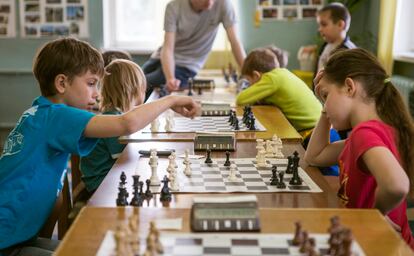Scientists say too much glutamate is why thinking hard makes you tired
Research shows that completing complex cognitive tasks releases this neurotransmitter, which can be toxic to the nervous system in high concentrations

On September 10, 1984, one of the most exciting world chess championships in history began. Facing off in the competition were the 21-year-old challenger, Garry Kasparov, and Anatoly Karpov, 12 years older and world champion for the last 10 years. After four wins for Karpov and five draws, Kasparov rebounded and forced 17 draws in a row. Karpov won another match and needed just one more to take the championship, but Kasparov forced another four draws and finally beat Karpov in game 32 for his first win. After another series of draws, the challenger won games 47 and 48. Five months later, with the score stuck at 5-3, the president of the International Chess Federation, Florencio Campomanes, ended the tournament without a winner. It was a controversial decision that Campomanes justified by pointing to the mental fatigue and physical deterioration of the players. This marked the beginning of a 20-year rivalry between the two players that went beyond the game of chess. But the question remained – why does thinking hard make you feel tired?
A team of French researchers thinks it has the answer – tasks that require a high level of mental effort produce extra quantities of molecules that are essential for good brain function, but can be neurotoxic in high concentrations. Our brains help us avoid this by creating a feeling of exhaustion that makes us stop what we’re doing. This intriguing hypothesis has not yet been confirmed by other neuroscientists and research.
To study why mental exercise can be as tiring as physical exercise, the French scientists had 50 people perform a series of tasks for 6.5 hours (the average workday in France). One group was asked to perform more complex tasks than the other, while the researchers studied their brains.
An eye-movement tracking system was used to record pupil dilation. Other studies have found that eyes stop moving and pupils dilate when the brain is performing a calculation or is in the final phase of decision-making. In addition, they used a brain-imaging technique (magnetic resonance spectroscopy) to measure activity in the prefrontal cortex, where the executive brain functions happen, and to identify the residuals produced by this activity. They also developed performance tests and questionnaires to subjectively measure the level of burnout.
“Glutamate is the main excitatory neurotransmitter in the brain; it’s found in many parts of the brain and is necessary for normal brain functions. We found that it increases during the performance of demanding mental tasks.”Antonius Wiehler, ICM Paris Brain Institute (France)
Recently published in Current Biology, the study found clear differences between the two groups (high-demand cognitive control tasks and low-demand tasks). They only observed signs of fatigue, including less pupil dilation, in the high-demand group. As time passed, the high-demand group began asking for more immediate rewards for task completion. But the most convincing evidence was what they saw happening inside the brains of the subjects. Those in the high-demand group had higher levels of a molecule – glutamate – in the synapses (the electrochemical connection between nerve endings) of the lateral prefrontal cortex, the brain region responsible for cognitive control.
Antonius Wiehler, a researcher with the ICM Paris Brain Institute and coauthor of the study, told EL PAÍS, “Glutamate is the main excitatory [synapse activation] neurotransmitter in the brain; it’s found in many parts of the brain and is necessary for normal brain functions. We found that it increases during the performance of demanding mental tasks.” Glutamate molecules, not to be confused with monosodium glutamate (a food additive), are released in the synaptic cleft (the short space between the end of one neuron and the start of another), where the exchange of information takes place. Then, says Wiehler, “… brain activity in this region is down-regulated to avoid further accumulation of glutamate.” This is the moment when the brain says it is tired.
The study results suggest that the physical changes and increased concentration of glutamate observed make any additional activation of the prefrontal cortex more costly, so that cognitive control is more difficult after a hard day of mental work.
The conclusions drawn by these French scientists differ from the predominant theories about mental fatigue, especially the depletion theories. Using the analogy of energy consumption during physical exercise, they contend that cognitive control (what, how, when to do or not do something) requires energy expenditure, and mental fatigue sets in when energy resources are depleted. But their study does not identify the specific energy resources depleted by cognitive control, although blood glucose has been suggested. Questions abound – why is playing chess fatiguing and seeing or hearing, which also require conscious brain work, not?
“Our findings show that cognitive work results in the accumulation of harmful substances.”Mathias Pessiglione, Pitié-Salpêtrière University Hospital in Paris (France)
Some psychologists and neuroscientists think that mental fatigue is an illusion produced by the brain that functions as a warning system, like the sensation of burning skin is an illusion warning about the danger of fire. Mathias Pessiglione, a neuroscientist with Pitié-Salpêtrière University Hospital in Paris (France) and a coauthor of the study, disagrees and says, “Some influential theories have proposed that fatigue is a kind of illusion created by the brain to make us stop what we are doing and move on to a more rewarding activity… but our findings show that cognitive work results in a real functional alteration – the accumulation of harmful substances. Fatigue is indeed a signal that makes us stop working, but it has a different purpose – to preserve the integrity of brain function.”
Tomás Segura is the head of the neurology at Albacete University Hospital (eastern Spain) and has been studying patients with post-Covid conditions like mental fog and fatigue. “In general, fatigue as a medical term refers to the sensation of shortness of breath associated with exercise or heart failure,” said Segura. “That is why many patients are diagnosed as having non-respiratory, non-cardiac fatigue. In that sense, we can call it neurological, cognitive or mental fatigue.” A mental fatigue similar to that caused by intensive cognitive tasks has been observed in a number of patients suffering from post-Covid conditions.
“Let’s say you have to go out to buy some bread, and just thinking about moving your body to do that makes you feel tired. Shortness of breath is not causing that feeling,” says Segura. “This has a lot to do with the brain regions where actions are planned, and with the need for glutamatergic transmission to function well for the action to happen. When glutamate, one of causes of brain damage in stroke victims, is insufficient, it can result in certain neurodegenerative diseases and may also produce the so-called neurological fatigue.”
Javier De Felipe, who heads the Cajal Cortical Circuits Laboratory at the Polytechnic University of Madrid (Spain), finds the French study very interesting and timely, but believes that their conclusions went too far. “Why thinking hard causes fatigue is an excellent question, but their conclusion is only a hypothesis,” said De Felipe. He believes the study failed to demonstrate the causal relationship between glutamate concentration and mental fatigue. “Cognitive control is centered in the prefrontal cortex, but this area is hyperconnected with other regions of the brain. Why does glutamate accumulate in some areas and not others?” he asks.
Leontxo García has been the EL PAÍS chess specialist since 1985, the year in which the longest series of chess matches in history ended, and was present for the second round of that epic championship. García recalls that in the 1984 championship, “Karpov won five straight matches right away and was obsessed with winning the championship 6-0 so that Kasparov would be crushed by a psychological trauma from which he could never recover. So instead of making risky moves to win, Karpov started playing very conservatively and waited for Kasparov to make mistakes. But the younger and physically stronger Kasparov realized that he had to wear Karpov down.” Both players had sponsors at the highest levels of the former Soviet Union. “The sponsors were both afraid that their man would lose, because Karpov was showing clear signs of exhaustion and Kasparov was just one match away from defeat. So Campomanes decided to suspend the championship and resumed it eight months later with the score reset to 0-0.” Thus, in the 1984 World Chess Championship, Campomanes prevented us from finding out whether Kasparov and mental fatigue could have eventually defeated Karpov.
Tu suscripción se está usando en otro dispositivo
¿Quieres añadir otro usuario a tu suscripción?
Si continúas leyendo en este dispositivo, no se podrá leer en el otro.
FlechaTu suscripción se está usando en otro dispositivo y solo puedes acceder a EL PAÍS desde un dispositivo a la vez.
Si quieres compartir tu cuenta, cambia tu suscripción a la modalidad Premium, así podrás añadir otro usuario. Cada uno accederá con su propia cuenta de email, lo que os permitirá personalizar vuestra experiencia en EL PAÍS.
¿Tienes una suscripción de empresa? Accede aquí para contratar más cuentas.
En el caso de no saber quién está usando tu cuenta, te recomendamos cambiar tu contraseña aquí.
Si decides continuar compartiendo tu cuenta, este mensaje se mostrará en tu dispositivo y en el de la otra persona que está usando tu cuenta de forma indefinida, afectando a tu experiencia de lectura. Puedes consultar aquí los términos y condiciones de la suscripción digital.









































